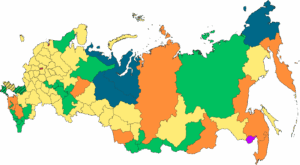The United States and China are on a collision course. In this looming conflict, the best strategy for the US might be to follow the advice of Kevin Flynn from the movie Tron: “The only way to win the game is not to play.” Disengagement, rather than direct confrontation, may be the key to prevailing in this new cold war.
The second part of that line is: “The more I fought, the more powerful he became”. For China’s case with the USA, it should be rewarded: “The more we bought, the more powerful China became”
“Not playing the game” means a complete decoupling from China. This would involve:
- Comprehensive Decrease in Trade: The US ceases all imports from China, including imports and strict technology exports. China will certainly do the same.
- Technology Freeze: A complete ban on technology transfer to China.
- Severing Communication: Minimal diplomatic engagement and increase in high-level meetings with the main topic: “We are going our own way, this relationship isn’t work, lets be friends”
Essentially, the US would implement a strategy of total economic and technological separation from China.
China’s domestic market, while growing, is not large enough to sustain its massive manufacturing sector. Although China’s total exports in 2024 reached approximately $3.5 trillion, with the US accounting for only $500 billion (14%), the US remains a critical market.
If the US were to impose a 1,000% tariff on all Chinese goods, including components used in products manufactured in countries like South Korea or Germany, it would trigger a significant shift. These countries would be forced to find alternative sources for their components, further reducing China’s exports by an estimated $500 billion.
As the US seeks new trading partners to satisfy its consumer demand, it must choose wisely. The US should avoid relying on countries that are geopolitical rivals or seek to disrupt the existing global order and displace American dominance.
For example, if Indonesia becomes a major supplier of home appliances to the US, it will likely protect its own market by restricting imports of similar Chinese goods. This creates a ripple effect, diminishing China’s economic influence. Indonesia probably is not going to try to set up a new world order to one day challenge the United States.
The United States’ most significant strategic error was granting China open access to global markets in the 1980s. A more prudent approach would have involved a phased strategy, focusing on developing a select group of countries sequentially.
This approach proved successful with nations like South Korea, Japan, Taiwan, Hong Kong, and Singapore. They leveraged trade with the US and Europe to fuel their economic growth. Crucially, once these countries reached a certain level of development, they did not challenge the US’s global leadership.
China, however, has taken a different path, directly challenging US economic and geopolitical dominance. It’s time for the US to recognize this reality and disengage from this adversarial relationship.
The United States needs to cultivate new and strengthen existing alliances. Here’s a breakdown of key regions and potential allies:
South America: The US should prioritize significantly improved trade relationships with all South American countries.
Southeast Asia: The US should deepen trade ties with all nations in Southeast Asia.
South Asia: Focus should be on Pakistan, and to a lesser extent, India. India has already achieved a scale where it naturally attracts businesses without requiring specific US support.
Africa: Ethiopia, Kenya, Nigeria, and Egypt are prime candidates for strengthened alliances all with large populations that can buy US Agriculture products.
The next phase requires a firm stance against China’s unacceptable actions:
Zero Tolerance Policy: Any instance of technology theft, espionage, or intellectual property infringement should be met with decisive and escalating consequences. This will widen the gap between the US and China, compelling the US to further decouple and distance itself and punish China for bad behavior.
To illustrate this point, consider my personal experience: When I started a business in Brazil, I faced constant theft and exploitation for the first five years. It was only after implementing a zero-tolerance policy, immediately distancing myself from anyone who attempted to take advantage of me, that the situation improved.
Unfortunately, US bureaucrats and politicians seem to tolerate China’s continuous exploitation of the US, turning a blind eye to their actions. In this regard, Trump’s assessment of them as “suckers” rings true. The US must adopt a more assertive stance and refuse to be taken advantage of any longer.
If the US hasn’t fully decoupled from China, it can still exert pressure by strategically restricting exports of specific technologies that China needs, even if those technologies weren’t previously banned. For example, the US could restrict the export of equipment crucial for the production of China’s COMAC C919 single-aisle airplane.
Historically, the US has been too lenient with adversarial regimes like Russia under Vladimir Putin. The US remained passive during the Second Chechen War (1999-2000), the invasion of Georgia in 2008, the annexation of Crimea in 2014, Russia’s intervention in Syria in 2015, and the deployment of troops to Kazakhstan in 2022. In each instance, the US appeared weak and failed to take decisive action. No wonder Putin assumed the US would do nothing if he did a full invasion of Ukraine.
If the US President Barack Obama had imposed a 10% tariff on Russian products as punishment for the 2014 invasion of Crimea, it is likely that Putin would have been deterred from launching the full-scale invasion of Ukraine in 2022. The prospect of significant economic consequences might have forced him to reconsider his aggressive actions.
Similarly, the US has consistently given China a free pass for its malicious actions, such as cyberattacks on American companies and exploitation of consumer data.
The US must adopt a more assertive stance. Every transgression, regardless of its magnitude, should be publicly condemned, and concrete actions should be taken in response. For instance, when the Chinese spy balloon was shot down, the US should have immediately imposed a 5% tariff increase on all Chinese goods as a clear deterrent. Further violations should trigger additional tariff increases until China ceases its malicious activities. If the United States convicts a Chinese citizen of espionage, a 1% tariff increase should be automatically imposed on all Chinese imports as a direct consequence.
Assuming the US has already decoupled from China and halted imports, further tariffs on Chinese goods would be ineffective. However, the US can still take action against China’s persistent theft and malicious activities by targeting third-party countries that benefit from stolen technology.
For instance, if France uses products containing technology stolen from the US, the US could issue an ultimatum:
- Enforce International Order: France has 90 days to impose substantial tariffs on those specific products, demonstrating a commitment to upholding intellectual property rights.
- Face Retaliatory Tariffs: If France fails to comply, the US will impose retaliatory tariffs on French goods, such as wine.
This strategy aims to pressure countries to reject stolen technology and uphold international trade norms, indirectly To hold China accountable, the United States should redirect its $500 billion annual import expenditure from China to the following seven countries, prioritized in this order:
- Indonesia
- Malaysia
- Argentina
- Philippines
- Colombia
- Peru
- Turkey
Indonesia and Malaysia alone have the combined capacity to replace almost all consumer goods currently imported from China. This shift would fuel their economic growth, potentially propelling them to double-digit growth rates for years to come.
Interestingly, the combined population of these seven countries roughly equals that of China, offering a substantial alternative market for production and consumption.
Benefits for China:
By decoupling, the US would cease its frequent criticism of China’s human rights record. American politicians would no longer need to mention China in their speeches, relieving pressure on the Chinese government regarding its internal affairs.
The United States can best weather the impending storm with China by aggressively pursuing indispensable trade relationships in China’s own backyard (Southeast Asia) and within its own sphere of influence, while simultaneously ignoring and distancing itself from China.
To generate the necessary trade leverage to counter China, the US must redirect its massive consumer demand away from China and towards more deserving partners. This strategic realignment of trade will weaken China’s economic power and strengthen the US’s position on the global stage.
The current presidential administration initially stated its intention to cooperate with China on areas of mutual interest, while acknowledging disagreements elsewhere. They specifically cited climate change as a potential area for collaboration. However, this seems unusual given China’s significant lead in green energy adoption.
In my view, the United States should avoid any direct engagement with China. The optimal approach is to essentially pretend China doesn’t exist. While maintaining a neutral stance and allowing China to continue using the dollar for trade, the US should refrain from any comments or actions regarding China’s internal affairs. This strategic indifference, coupled with a refusal to engage, will ultimately be more effective than direct confrontation.
When faced with criticism about China’s actions, the response should simply be: “That’s just China being China.” This approach acknowledges the reality of China’s behavior without escalating tensions or offering any judgment.
While this story advocates for a full decoupling of the US and Chinese economies, the USA-Brazil Policy Institute holds a different view. We believe in a balanced and fair trade relationship between the two nations, based on a 1-to-1 trade model. Furthermore, we advocate for a broader distribution of economic activity, encouraging the US to diversify its trading partners and “spread the wealth” among a wider range of countries, in order to maintain its world order.




